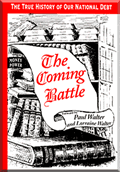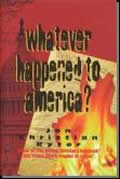ARRESTING
YOUR ASSETS
PART 3 of 4
By
Jon Christian Ryter
March 9, 2011
NewsWithViews.com
When we weren't paying attention in 1933, a slight of hand by the Roosevelt Administration and the FDR-controlled Congress changed the definition of private property with the single-day passage of the Emergency Banking Relief Act of 1933. A slight modification of the Trading With the Enemy Act of 1917 was incorporated into that legislation which allowed the government to seize all gold that was legally-owned by the American people.
The legislation claimed that the right of the American people to own any property emanated solely from the government. As such, the government could, whenever the need to do so arose, rescind that right and claim any property that previously had rightfully and legally belonged to the people. On March 9, 1933, all Roosevelt and the Fed bankers were concerned about was seizing all of the gold in the legal possession of the people of the United States and replacing their gold and silver-backed currency with a debt-backed federal scrip. It worked. Facing a fine of $10,000 and up to 10-years in prison if they failed to do so, the American people traded their gold certificates for bank notes. To government—any government—a precedent not used is a precedent wasted.
Since the New Deal the federal government has successfully used Article I, Section 8 of the Constitution to claim rights it does not constitutionally possess, arguing in court before generally friendly magistrates that it has a compelling need under the 9th Amendment to "temporarily" abrogate or infringe upon the rights of the people because of one national emergency or another. During the Prohibition years, government agents regularly seized the assets of organized mobsters who were engaged in the trafficking in bootleg liquor, but the police lacked the ability to dispose of those items until after those accused of violating the Volstead Act were prosecuted and convicted. It made sense to most Americans that the contraband was taken or destroyed by the feds, since the people clearly understood that home brew and bootleg whisky were illegal. Therefore, the laws that required their seizure and destruction made sense. However today, seized assets are not destroyed. They are converted into cash.
No government—local, county, State or federal—will willingly return forfeited assets once they have been seized since those assets are liquidated as quickly as possible and the money distributed between the appropriate law enforcement agency and the appropriate court, with the seizing agent or police officer receiving his or her "commission"—pretty much like a petty thief taking his stolen wares to the local pawn broker and receiving about 10% of the value.
According to Cary Copeland, the Justice Department's Director of Asset Forfeiture under President Bill Clinton (by 1992 the federal government had actually created a department to handle the growing influx of asset seizures), when he was called before the House Judiciary Committee by Chairman Henry Hyde [R-IL] in June, 1993 to discuss the issue of civil asset forfeitures. "Asset forfeiture is still in its relative infancy as a law enforcement program." Copeland told the committee, adding that the FBI under Attorney General Janet Reno anticipated the seizure of private property would increase at the rate of about 25% a year for at least three years. Copeland declared that "...asset forfeiture is to the drug war what smart bombs and air power are to modern warfare." The use of civil asset seizure against private citizens by law enforcement was a hurdle cleared by the US Supreme Court in 1990 when the high court declared it to be a valid exercise of the prerogative of government which had a compelling interest in eliminating crime. It was used quite often by the Bush-41 Justice Department.
Civil libertarians believed that when Clinton got into the White House, the practice would stop, but Reno found the practice as expedient as Bush's Attorney General, Richard Thornburgh. Civil asset seizures that clearly violated the 4th and 5th Amendments actually increased dramatically under Clinton not only at the federal level, but the practice was eagerly embraced by cash-starved governments at both State and municipal levels as well. There were now more cases in the courts filed against cars, money, houses and other personal property than there were criminal actions filed against living people accused of plotting or committing the crimes for which their property was seized.
Civil asset forfeitures became so prevalent from 1980 to 1988 that the federal courts began to question the government's application of Racketeer Influenced & Corrupt Organizations Act of 1970 [RICO] (an amendment that was added to the Organized Crime Control Act of 1970) to common citizens. RICO ended up in front of the 8th Circuit Court of Appeals in 1989. Judge Richard Arnold of the 8th Circuit curbed the use of RICO to go after non-crime family related "white collar" criminals. The appellate court judge ruled that a pattern of racketeering must exist and there must be a physical (not suspected) relationship between the illegal acts of the mobster and the assets which are being seized—and the likelihood of the criminal activity continuing if the assets are not seized. The 8th Circuit forced the courts to meet rigid standards before they could file under RICO, since RICO claims granted the government an extraordinary windfall—the right to seize all of the assets of the accused before the commencement of legal action. Generally, once all of the assets are seized, the defendant no longer possesses the means to defend himself and finds himself at the mercy of the government's prosecutors.
In 1990, on a federal appeal, the Supreme Court overturned the 8th Circuit and reopened the floodgate for the misuse of RICO. The Justice Department argued that the 9th Amendment not only gave them the right, but a compelling need to to stop crime in any form by any means available—even asset seizure without due process. The high court agreed, and actually broadened the powers of the Justice Department under the commerce clause of the Constitution. (What is most interesting about the "commerce clause," is that it is not an implied or specific right granted to the federal government by the Constitution. It is merely an explicatory clarification of the specific, limited rights that had been granted to the federal government and were enumerated below the clarification of how the government was to utilize the limited power granted to it.)
Every unconstitutional act passed by Congress and signed into law by the President of the United States—tons upon countless tons of words over the past 218 years—have been enacted through the broadened powers of the "commerce clause" which says: "The Congress shall have the right to lay and collected taxes, duties, imposts and excises, to pay the debts and provide for the common defense and general welfare of the United States...to regulate commerce with foreign nations and among the several States and with the Indian tribes..." The "commerce clause" has been used by the federal government to seize the assets of American people without due process although there actually are no "rights" here, implied or otherwise. It is merely a preliminary statement authorizing the government to lay and collect taxes in order to defend the country and the welfare of the people. Below that preliminary clause, the authority of the federal government is enumerated.
The government's fidelity to the Constitution of the United States died in 1933. Once the government discovered it could legislatively abrogate the rights of the people without an armed rebellion marching on the nation's capital, it did so—and it has continued to do so for 72 years. As the federal bureaucracy has proven over the last seven decades, the restraints on the ability of government to enact whatever laws it wishes—as long as they are supported by a popular majority—are virtually nonexistent even if the laws they enact violate the tenets of the Constitution and the Bill of Rights.
| Subscribe to the NewsWithViews Daily News Alerts! |
But occasionally, even Congress knows when its gone too far. By 1992, with the House Judiciary Committee examining the ramifications of civil asset forfeiture, the Justice Department realized it had to reign in its own law enforcement agencies—or at least make it appear they were. In its 1992 annual report on asset seizures, the Justice Department declared that "...[n]o property may be seized unless the government has probable cause to believe that it is subject to forfeiture." That clarification arose from the fact that far too many federal seizures were being made based on "hearsay" information—rumors and neighborhood gossip based on "suspicions" about private neighbors from anonymous sources. Hearsay evidence cannot be admitted into a court of law, but it was being used by the DEA and the FBI to seize the assets of American citizens with few of those Americans ever being arrested for the crimes they were suspected of committing. For part four click below.












 Share
This Article
Share
This Article






